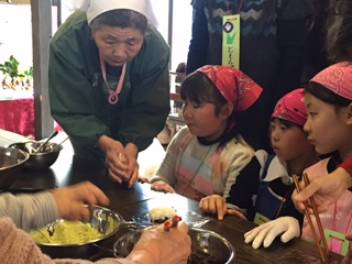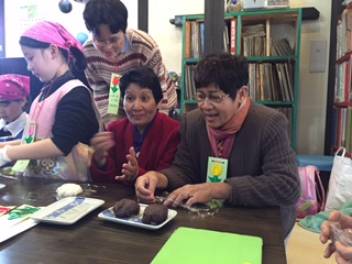 On Saturday, I travelled to Ofunto, four hours north of Sendai, the Japanese city which is hosting the Third World Conference on Disaster Risk Reduction.
On Saturday, I travelled to Ofunto, four hours north of Sendai, the Japanese city which is hosting the Third World Conference on Disaster Risk Reduction.
The bus took us past rice paddies firmly closed for winter, houses with tiled roofs and sculpted gardens each with precisely clipped trees making cloud, doughnut, pillar and box shapes.
As we approached the coastal zone devastated by the Tsunami four years ago there were still signs of abandoned houses amongst the regeneration. 18,000 people died and although there is massive reconstruction happening, some areas are still being levelled in preparation for rebuilding. Some communities remain in temporary housing.
Ibasho café
Our destination was Ibasho Café, the brain child of Dr Emi Kiyota. It was built after 18 months of consultation and planning with local elders who run the café and made every decision on design, construction and activities. It is an inspiring alternative to government-run facilities.
The café is housed in an old Japanese style home, built around 60 years ago for the family of Mutsuko Ozawa who donated the building when the family decamped after the Tsunami. It has a central stove with two bubbling kettles and a busy kitchen where food is prepared for local residents who drop in on regular basis and make a small donation.
At one end there is an area for workshops and events. At the other, there are tables and chairs for eating. Glass windows down one side look over the surrounding houses to the mountains beyond.
Building on people’s strengths
The group running the café talked to us about their lives, the importance of the café to them and the programmes they run including a children’s library. We met 72-year-old Noriko Kikuchi who escaped the Tsunami and now runs the Facebook page for the café.
The principles behind the café are to improve wellbeing, an approach which builds on people’s strengths not their physical weaknesses. A key principle is “Embracing imperfection gracefully”.
The café has created a space for older people to connect with each other and pass on their experience and knowledge to other generations. This links to the idea of resilience that the conference in Sendai is aiming to promote.
Governments are working out how to meet the needs of marginalised people as well as how to support the capabilities of communities, including older men and women, to prepare for disasters and to recover afterwards.
Older people need to be included in decision making
 Older people are massively marginalised – people over 65 years made up 56% of deaths in the Japan Tsunami despite this comprising only 23% of total population. Ibasho demonstrates they have capacities to be part of the solution if they are included in decision making.
Older people are massively marginalised – people over 65 years made up 56% of deaths in the Japan Tsunami despite this comprising only 23% of total population. Ibasho demonstrates they have capacities to be part of the solution if they are included in decision making.
With me on the trip were Annie Lambo and Rosalina Sangales from the Philippines. They live in Ormoc City which was hit by Typhoon Haiyan in 2013. They are planning to open up a similar enterprise in their district.
Led by older people, it will incorporate some of the ideas from Ibasho and develop new ideas relevant to their communities, which will help generate income.
Initial ideas include waste recycling and a mobile food stall. They loved the focus on food and got involved in sushi preparation and the drop in sessions for kids to make traditional cakes from rice, red beans and ground soya.
Find out more about our work on disaster risk reduction and at the conference in Sendai.
Find out more about Ibasho café.
